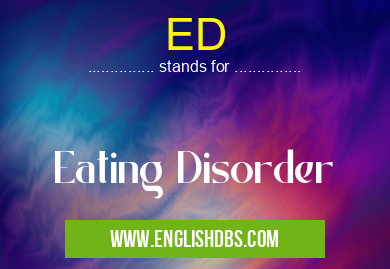What does ED mean in MEDICAL
ED stands for Eating Disorder and is a psychological disorder resulting from the excessively unhealthy habits of eating. Eating disorders are usually characterized by an unhealthy fixation on certain food items, body size, and weight, that can lead to severe physical and mental health consequences. People with an eating disorder may experience feelings of guilt or shame surrounding meals, have an obsession with losing weight or maintaining a certain body shape, or develop unusual eating habits. These disordered behaviors can take many forms including anorexia nervosa, bulimia nervosa, binge eating disorder and other specified feeding or eating disorders (OSFED). Treatment options for ED include medical management, therapeutic interventions like cognitive behavior therapy (CBT), family therapy, and medication such as antidepressants.

ED meaning in Medical in Medical
ED mostly used in an acronym Medical in Category Medical that means Eating Disorder
Shorthand: ED,
Full Form: Eating Disorder
For more information of "Eating Disorder", see the section below.
What Does ED Mean in Medical Terms? In medical terms, ED stands for Eating Disorder. It is a mental disorder in which people have a dysfunctional relationship with food that can lead to physical symptoms and psychosocial difficulties. Eating disorders typically involve one or more of the following behaviors
excessively restricting food intake; binging on large amounts of food; compulsive overeating; purging by self-induced vomiting or laxative abuse; and over-exercising to lose weight or to prevent gaining any extra weight. People with an ED may also feel intense feelings of guilt or shame after eating too much or being overweight or underweight relative to societal standards.
Essential Questions and Answers on Eating Disorder in "MEDICAL»MEDICAL"
What is an Eating Disorder?
An eating disorder is a mental illness which is characterized by highly distorted attitudes and behaviours towards food, weight and body shape. It includes conditions such as anorexia nervosa, bulimia nervosa, binge eating disorder, pica, rumination disorder and avoidant/restrictive food intake disorder.
What are the symptoms of an Eating Disorder?
Common signs and symptoms of an eating disorder may include rapid weight loss or gain, fixation on food or caloric intake, changes in eating habits, constant fear of gaining weight or being “fat”, obsessing over physical appearance and body image, avoiding meals or hiding food consumption.
How can I help someone with an Eating Disorder?
The best way to help someone who has an eating disorder is to show them that you are available for support in whatever way they need. Encouraging them to seek out professional intervention may also be beneficial. Offer acceptance and understanding without judgement which will likely motivate them to continue their recovery journey.
Is there a cure for Eating Disorders?
There is no known cure for eating disorders but they can be managed with therapeutic interventions such as Cognitive Behavioral Therapy (CBT), Dialectical Behavior Therapy (DBT) or mindfulness-based approaches. Nutrition counseling may also be beneficial in helping individuals learn better nutrition practices.
Are there any long-term effects of an Eating Disorder?
Long-term effects from having an eating disorder can include severe medical problems such as osteoporosis, heart problems and digestive issues due to malnourishment or dehydration as well as psychological issues such as anxiety, depression and suicidal thoughts.
Final Words:
The acronym ED stands for Eating Disorder which is a complex psychiatric condition that has psychological roots affecting behaviour surrounding dieting along with potential biological markers involved in the development of this condition as well. The most common psychiatric components consists of Anorexia Nervosa , Bulimia Nervosa , Binge –Eating Disorder (BED), along with other specified feeding/eating disorders (OSFED ). Those who suffer from ED often exhibit extreme distress concerning their body image along with obsessive thoughts concerning dieting choices resulting in potentially dangerous behaviours such abnormal dietary restriction , binging episodes , vitamin deficiencies as well as potential cardiac issues due these maladaptive behaviours .
ED also stands for: |
|
| All stands for ED |
